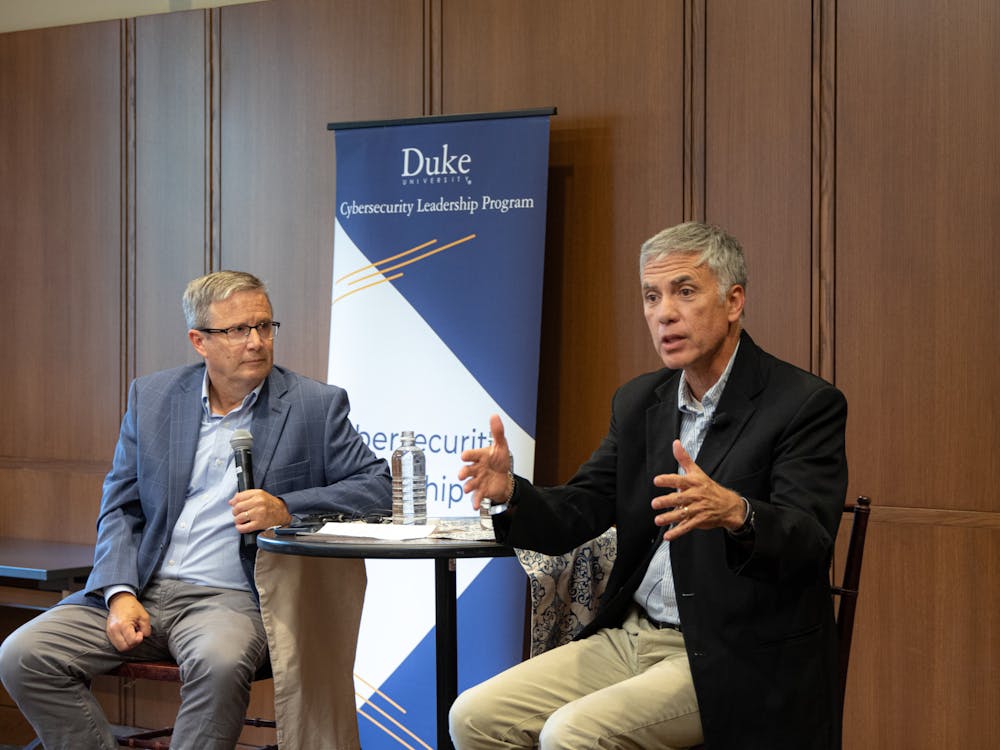General Paul Nakasone, former commander of the U.S. Cyber Command, director of the National Security Agency and chief of the Central Security Service, spoke about the role of the NSA, election security and emerging technologies at a Thursday event.
The event, a Marshall Military Conversation titled “Evolving Technologies and the Threats to National Security,” was hosted by the Duke Program in American Grand Strategy and co-sponsored by the Sanford Cyber Policy Program. Peter Feaver, professor of political science and public policy and AGS director, moderated the conversation.
Nakasone served concurrent roles leading Cyber Command, NSA and CSS from May 2018 until February 2024, and was previously the commander of the U.S. Army Cyber Command between October 2016 and April 2018, serving in both the Trump and Biden administrations.
He is also the founding director and leader of Vanderbilt University’s Institute of National Security and has served on the OpenAI Board of Directors as a member of the Safety and Security Committee since June 2024.
Intelligence and national security
Nakasone described Cyber Command — one of the 11 U.S. combatant commands — as responsible for defending Department of Defense networks, data and weapons systems.
He then defined the role of the National Security Agency, which he began leading concurrently with the Cyber Command once confirmed in April 2018.
“If you were going to boil it down to two things, this is what NSA does: they make code, and they break code,” Nakasone said. “… Think about our most sensitive communications [and] our most significant weapons platforms … all of the keys, codes and cryptography are made at the National Security Agency.”
Nakasone explained that the NSA operates outside of the U.S., where it looks to “get into our adversaries’ most sensitive communications, their data and their weapons systems” to find “indications and warnings” for U.S. policymakers and military commanders.
The NSA is the largest component of the U.S. intelligence community, which Nakasone asserted was due to the large number of employees — ranging from language interpreters to mathematicians — needed to fulfill its “technical mission.”
He described 2018 as a “difficult time” for the agency, citing the aftermath of the 2013 Edward Snowden leaks and a private sector that was “very attractive” to NSA employees. These obstacles, he said, had a negative impact on employee morale.
“These are people that follow the letter and the rule of the law to the point of when we make mistakes, we report on ourselves,” Nakasone said, speaking of NSA employees. “And so to have in 2013 the allegations that the National Security Agency was spying on Americans, that you couldn't trust this agency — for a population of workers that had spent a good part of a decade in places like Iraq and Afghanistan and other places in the Middle East, saving lives, ensuring the security of our forces, deploying over 10,000 people — to be accused of that is really difficult.”
Election security
Feaver transitioned the conversation to the aftermath of the Sept. 11 attacks, during which Nakasone noted he was present in the Pentagon. He spoke about the The National Commission on Terrorist Attacks Upon the United States — commonly referred to as the 9/11 Commission — which was convened in late 2002 to create a “full and complete account of the circumstances surrounding” the attacks.
According to Nakasone, the commission found that many U.S. agencies “had a little piece of the story … but they couldn’t connect the dots.” He noted that the ability to share information “legally and lawfully with different agencies” was an improvement that came from the commission and is done “much better today.”
Nakasone recounted his 2018 Senate confirmation hearing, which was centered around the security of the 2018 election.
“We were clearly seeing the challenges of an adversary being in our democratic process,” Nakasone said, referring to a Russian influence operation conducted during the 2016 U.S. election. “… I was pretty certain that either there was going to be a safe and secure election in 2018, or there was going to be a new commander of U.S. Cyber Command and a new director of the National Security Agency.”
Following the controversy, he made plans early in his tenure as NSA director to “secure elections” through efforts including “understand[ing] the threat better than they understand themselves” and sharing information about election interference threats with the Department of Homeland Security and the FBI.
Nakasone raised another key strategy for deterring election interference: “Shine a light on it, make sure everyone sees it, and talk about it.”
He pointed to a press conference held in 2020 by the then-FBI director and then-director of national intelligence to tell the American people about Iranian attempts to influence the U.S. presidential election.
Yet, according to Nakasone, recent U.S. elections have been more secure.
“[In] 2018, 2020 [and] 2022 we’ve had safe and secure elections … [in] 2024, we will have another safe and secure election,” he said.
Nakasone pointed out that being more able to “talk about things” leads to “greater trust and confidence” in the government and particularly in the NSA.
He said this observation contributed to decisions such as the fall 2021 release of intelligence about “Russian activity with regards to Ukraine.” According to Nakasone, the move was supported by substantial “thought” and “conversations” about “what we can say and what we can’t say.”
Nakasone added that releasing information in a way that “protects sources and methods” capable of “build[ing] a coalition of like-minded countries like NATO” can be of “international interest.”
Role of emerging technologies
Nakasone further described the responsibilities of leading Cyber Command as bringing “options” to the secretary of defense, as well as the president, who makes final decisions.
“Among the most critical skills of a strategic leader is communication,” he said. “When you go talk to the president, there really are no PowerPoint slides — you have a conversation.”
Given the “incredible amount of information” that presidents have to take in — and the period of “three to five minutes” that may be afforded — it becomes crucial to communicate in a manner that can be understood, Nakasone explained.
Nakasone transitioned to discussing evolving technologies and their potential impact on code breaking.
“I think that the next stage of the power of computing will reside in quantum computing,” he said. “This idea that perhaps one day a quantum computer can be built that can break almost all known encryption to date.”
According to Nakasone, there are algorithms shared with the government and private sector that can “defeat this type of capability,” but this leads to a “race” to implement quantum-resistant encryption before quantum capability arises.
He also conveyed optimism about the power of technologies such as Elon Musk’s Starlink, a “satellite internet constellation” that provided communications for the national command authority of Ukraine shortly after a February 2022 Russian attack on Ukraine’s communications infrastructure.
Nakasone then spoke on his decision to serve on the board of OpenAI.
“When I thought about the future, I believe that [AI] truly is the capability — the technology — that must continue to be led by the United States and a series of different partners,” he said.
Get The Chronicle straight to your inbox
Signup for our weekly newsletter. Cancel at any time.

Michael Austin is a Trinity junior and managing editor of The Chronicle's 120th volume.

